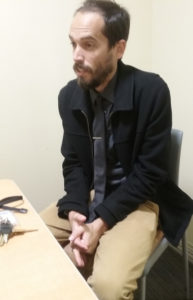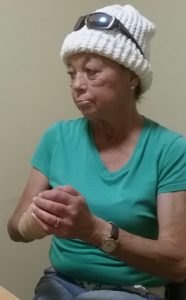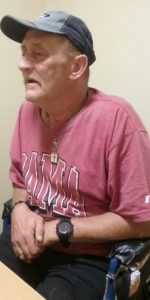Shelter residents coping with homelessness during holidays
HOMELESS FOR THE HOLIDAYS
By Cedrell Mitchell
Outlook writer
Scott Brown and Trisha Tolliver might not have known of each other if it were for the worst of fate that brought them under the same roof.
Their paths cross almost daily at the Kearney Center, a Tallahassee shelter for the homeless. They have been there for more than a year, and like the nearly 400 other residents, they will spend the holidays away from a permanent home.
They once had their own home and all of the amenities. They have family, too. However, like everything else in their lives nowadays, those relatives are no longer around.
They will not wake up to a Christmas tree and tons of gifts. That, however, does not mean they will not have an opportunity to make the best of their holidays.
During this holiday season, the Kearney Center for the homeless will not be short of fun as the center is decorated with two huge trees in the entry and cafeteria.
“We try to do things that help during the holidays,” said Jacob Reiter, director of the Center.
One event that Tolliver and Brown are both excited for is the mini holiday concert that Reiter said would be put on by the Shelter Band. Reiter plays guitar in the band, which also plays local gigs.
Brown and Tolliver could not be more grateful.
“The staff is wonderful,” Tolliver said. “Thank God for these people here.”
Reiter is expecting an influx of residents over the next few months when the weather is expected to get colder. Many will make it there just in time for the holidays.
“It tends to get colder so the volume of people needing service (increases),” Reiter said. “Another thing we notice is that it can be difficult for some folks that may have lost family members or spouses (because) many emotions come up.”
Brown, 55, and Tolliver, 65, are enduring adversities like they never expected. She found herself in the shelter when high medical bills for treating colon cancer left her homeless. He lost a leg to diabetes not long after his home burned down in Panama City.
Tolliver fought back tears more than once while sharing her story with visitors. But she somehow managed a broad smile through it.
“Personally I like to put a smile on people’s face,” she said. “So I try to pass out candy canes. It is difficult in here (but) I am trying to make a bad situation a little bit better.”
A Mansfield, Ohio, native, Tolliver spent almost 30 years in Las Vegas, where she was commonly mistaken for a showgirl. She actually worked as a casino dealer and bartender.
She kept company with some of the people who created the reputation of Las Vegas being home to the rich and famous. Sammy Davis Jr., Frank Sinatra and Dean Martin are a few of the people Trisha said she would socialize with during her better days.
“It was a fun and exciting time,” she said.
Then, her world began to crumble. She endured an abusive relationship for a while and she lost her only child at age 3 in an auto accident.
Eventually she found her way to Tallahassee and set up in an upscale neighborhood. That didn’t last long before cancer set in and completely changed her life.
Brown, also an Ohio native, was living a decent life before being hit with challenges that turned him around.
He served a short time in the Army before settling in Panama City. He eventually became a commercial fisherman, developing a passion for his job.
He said he misses it and wishes he could go back.
Of course, he has plenty of fisherman’s stories. In particular he has vivid memories of the first blue fin tuna that he caught. As he tells it, the fish weighed 900 pounds.
Three years ago, his mobile home burned down in Panama City. In the midst of dealing with homelessness, Brown lost his leg to diabetes, which he said was brought on by alcoholism.
Brown expects to get financial assistance from the government for housing soon. When he does, he hopes to walk out of the Kearney Center on a new prosthetic leg.
The prospects of getting another start on life give him hope. Never mind that he won’t have hundreds of others around him, he said.
“All my family is gone but I don’t let it bother me too much,” he said with a chuckle. “I’m happy-go-lucky 90 percent of the time and then the bad times I keep to myself and sort it out.”










